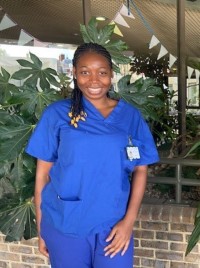To celebrate Black History Month, we asked our staff from Black, Asian and Minority Ethnic (BAME) communities to share their thoughts on what the month means to them, the centuries-long contribution of BAME communities to healthcare, and how Black history can be recognised and celebrated beyond just one month.
First up is Stella Esan, staff nurse in adult intensive care, and co-chair of Royal Brompton and Harefield’s BAME staff network.

The theme for this year’s Black History Month is ‘Proud To Be’, to encourage Black and Brown people to share what they are proud to be, in the context of culture, heritage and identity. What are you proud to be?
I am incredibly proud to be the daughter of two bold Nigerian/UAR (United African Republic - name change pending due to "Nigeria" having strong ties to Britain's colonisation) immigrants who aren’t afraid to have uncomfortable conversations about race, cultural identity, and heritage. I am proud of my melanated skin.
I know how fundamental Black people have been, and are, to the UK’s economy and culture. However, growing up I struggled to understand why this was taught to me at home and not reflected at school.
Luckily, my parents taught me to question and challenge everything. And because of my upbringing, I feel confident to champion diversity and inclusion, both in my role as chair of our BAME staff network and in other opportunities I get, to ensure an equal and open society. It is an honour to know where I came from and I want to make sure that every Black child born in the UK today knows about their history and feels equally as proud of their heritage as I do. I also want them to have the same opportunities in their education and career as any other child.
One-in-five of the NHS workforce comes from BAME backgrounds. How would you sum up the importance and contribution of BAME workers in healthcare?
Post-war shortages affected healthcare services and transport services to such an extent that the UK recruited Black people from its colonies and former colonies to help rebuild them. We all should know about the major contribution Black people made to how the NHS was built, so that Black unsung heroes like Chief Kofoworola Abeni Pratt FRCN (the first Black Nurse to work in the NHS) and Mary Seacole (a medical pioneer who set up her own hospital during the Crimean war) are praised in the same way as someone like Florence Nightingale.
What progress do you think still needs to be made to address race inequality in the workplace generally?
Acknowledging the issue of racism is the first step. We need to challenge managers when they say "I don't see colour" because unless they are actually colour blind, everyone sees colour.
Secondly, do your research and look at the facts. Almost forty per cent of staff at Royal Brompton and Harefield identify as BAME, yet a significant proportion of these employees occupy lower band positions, while White staff continue to be overrepresented in higher band and senior management positions. We need to ask ourselves why and do something about it. We need more robust recruitment and selection practices and managers need to be held accountable. We need to reverse the attitudes that consciously or unconsciously favour the majority and uphold the structures that preserve one race as the most senior. We need to succession plan. We need to truly understand how detrimental it is leaving untapped talent in lower bands, especially if we are to be a truly inclusive society.
We, unfortunately, have a long way to go, but I am confident we will get there.
How do you think Black history, contribution and achievement can be recognised and taught throughout the year?
I think White Fragility has to be addressed more widely. "All Lives Matter" mindsets need to be restructured – I would say that all lives can't matter until Black Lives Matter.
Next, hear from Vibha Teli, principal pharmacy technician for clinical trials >
